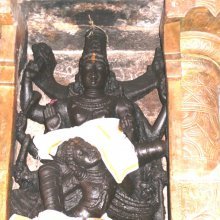Bhagavad: 1 definition
Introduction:
Bhagavad means something in Hinduism, Sanskrit. If you want to know the exact meaning, history, etymology or English translation of this term then check out the descriptions on this page. Add your comment or reference to a book if you want to contribute to this summary article.
Images (photo gallery)
In Hinduism
Vedanta (school of philosophy)
Source: Shodhganga: Siva Gita A Critical StudyBhagavad (भगवद्) or Bhagavadgītā refers to one of the sixty-four Gītās commonly referred to in Hindu scriptures.—Gītā is the name given to certain sacred writings in verse (often in the form of a dialogue) which are devoted to the exposition of particular religious and theosophical doctrines. Most of these Gītās [i.e., Bhagavad-gītā] originate from the Mahābhārata or the various Purāṇas.

Vedanta (वेदान्त, vedānta) refers to a school of orthodox Hindu philosophy (astika), drawing its subject-matter from the Upanishads. There are a number of sub-schools of Vedanta, however all of them expound on the basic teaching of the ultimate reality (brahman) and liberation (moksha) of the individual soul (atman).
Languages of India and abroad
Sanskrit dictionary
Source: Cologne Digital Sanskrit Dictionaries: Monier-Williams Sanskrit-English DictionaryBhagavad (भगवद्):—[from bhaj] in [compound] for vat.
Sanskrit, also spelled संस्कृतम् (saṃskṛtam), is an ancient language of India commonly seen as the grandmother of the Indo-European language family (even English!). Closely allied with Prakrit and Pali, Sanskrit is more exhaustive in both grammar and terms and has the most extensive collection of literature in the world, greatly surpassing its sister-languages Greek and Latin.
See also (Relevant definitions)
Starts with (+71): Bhagavad-bhakta, Bhagavad-gita, Bhagavadananda, Bhagavadaradhana, Bhagavadaradhanakrama, Bhagavadaradhanasamarthana, Bhagavadaradhanavidhi, Bhagavadarcana, Bhagavadarcanamahatmya, Bhagavadarcanaprastava, Bhagavadarcanavidhi, Bhagavadashrayabhuta, Bhagavadavatara, Bhagavadbhakta, Bhagavadbhakti, Bhagavadbhakticandrika, Bhagavadbhakticandrikollasa, Bhagavadbhaktimahatmya, Bhagavadbhaktinirnaya, Bhagavadbhaktiprashamsa.
Full-text (+1093): Gita, Nistraigunya, Kurukshetra, Jnanayoga, Vairagya, Nishkamakarma, Karmayoga, Bhagavadgitarthastotra, Bhagavadgitalakshabharana, Bhagavadbhakticandrika, Bhagavadbhaktiratnavali, Bhagavadgitatatparya, Bhagavadgitapratipada, Bhagavadgitaprasthana, Bhagavadgitavivarana, Bhagavadbhaktitaramgini, Bhagavadgitashaya, Bhagavadaradhanakrama, Bhagavadgitarthasara, Bhagavadbhaktinirnaya.
Relevant text
Search found 101 books and stories containing Bhagavad; (plurals include: Bhagavads). You can also click to the full overview containing English textual excerpts. Below are direct links for the most relevant articles:
Ramanuja’s Interpretation of the Bhagavad-gita (by Abani Sonowal)
Shiva Gita (study and summary) (by K. V. Anantharaman)
Appendix 2 - Śiva Gītā vis-a-vis Bhagavad Gītā and Upaniṣads
Appendix 1 - The Pre-eminence of Śiva Gītā over Other Gītās
Chaitanya Bhagavata (by Bhumipati Dāsa)
Verse 3.4.432 < [Chapter 4 - Descriptions of Śrī Acyutānanda’s Pastimes and the Worship of Śrī Mādhavendra]
Verse 1.2.72 < [Chapter 2 - The Lord’s Appearance]
Verse 2.21.56 < [Chapter 21 - The Lord’s Chastisement of Devānanda]
Amarakoshodghatana of Kshirasvamin (study) (by A. Yamuna Devi)
Philosophy (5): Bhagavad Gītā < [Chapter 4 - Cultural Aspects]
Miscellaneous (3): Omens (Nimitta) < [Chapter 3 - Social Aspects]
Philosophy (6): Advaita < [Chapter 4 - Cultural Aspects]
Garga Samhita (English) (by Danavir Goswami)
Verse 6.21.2 < [Chapter 21 - In the Description of the Third Fort, the Glories of Piṇḍāraka-tīrtha]
Verse 2.24.15 < [Chapter 24 - The Story of Asuri Muni in the Rāsa-dance Pastime]
Verse 6.21.6 < [Chapter 21 - In the Description of the Third Fort, the Glories of Piṇḍāraka-tīrtha]
Bhagavad-gita-mahatmya (by Shankaracharya)
Related products
(+1 more products available)








